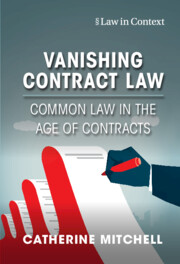Book contents
- Vanishing Contract Law
- Law in Context
- International Journal of Law in Context: A Global Forum for Interdisciplinary Legal Studies
- Vanishing Contract Law
- Copyright page
- Contents
- Preface
- Acknowledgements
- Table of Cases
- Table of Statutes
- 1 Vanishing Contract Law
- 2 Contract Common Law Trends
- 3 Contractualisation and the Common Law Retreat
- 4 Private Ordering, Regulation and Contract Law
- 5 Contracts through the Gaps
- 6 Future Challenges for Contract Law
- 7 The Possibility of Common Law Revival
- 8 Conclusion
- Select Bibliography
- Index
7 - The Possibility of Common Law Revival
Published online by Cambridge University Press: 25 August 2022
- Vanishing Contract Law
- Law in Context
- International Journal of Law in Context: A Global Forum for Interdisciplinary Legal Studies
- Vanishing Contract Law
- Copyright page
- Contents
- Preface
- Acknowledgements
- Table of Cases
- Table of Statutes
- 1 Vanishing Contract Law
- 2 Contract Common Law Trends
- 3 Contractualisation and the Common Law Retreat
- 4 Private Ordering, Regulation and Contract Law
- 5 Contracts through the Gaps
- 6 Future Challenges for Contract Law
- 7 The Possibility of Common Law Revival
- 8 Conclusion
- Select Bibliography
- Index
Summary
This chapter explores the potential for the revival of the common law of contract.The emphasis is on the possibility of judicial action to reverse some of the movements explored earlier in the work. Contract scholars with a more pragmatic or practical approach to the subject have long maintained that contract law must do more to distinguish different contracting contexts and to develop appropriate rule sets accordingly. The recent engagement with the concept of relational contracting demonstrates a judicial ambition (admittedly not shared by all) to create a more responsive, contextual and flexible contract law.The development of relational contracts is considered and critiqued in the chapter. Developments in other common law jurisdictions (notably the elaboration of an organising principle of good faith in Canada) are contrasted with English law. The chapter concludes that English law is unlikely to follow the lead of other common law countries in articulating good faith principles. Limitations on the litigation system in England are also examined.
- Type
- Chapter
- Information
- Vanishing Contract LawCommon Law in the Age of Contracts, pp. 175 - 201Publisher: Cambridge University PressPrint publication year: 2022

